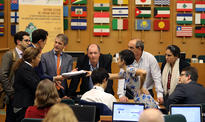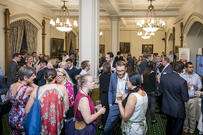String of new research projects for FNI

The Fridtjof Nansen Institute greets the new year with a string of new projects in its research portfolio.

The Fridtjof Nansen Institute greets the new year with a string of new projects in its research portfolio.

The Fridtjof Nansen Institute (FNI) has received funding for three large, multi-partner research projects: one on Norway's 'green transition', one on EU energy market regulations, and one focusing on new economic possibilities on Svalbard.

The EU Horizon 2020 project DIVERSIFOOD, to which FNI has been a contributing partner, has been awarded a 2019 Etoiles d’Europe – Stars of Europe – award.

With rapid changes underway in the Arctic and in the oceans more generally, national coast guard services are becoming a more important tool for states, both symbolically and functionally.

Does energy poverty exist in Norway, where ‘no one’ is poor, and energy is abundant? Torjus Lunder Bredvold, master student affiliated with the Fridtjof Nansen Institute (FNI), digs into the phenomenon - and recently won a student pitching contest for his project.

Based on a proposal from Norway, developed by FNI’s expert Regine Andersen, the Governing Body of the Plant Treaty has agreed to step up its work on conservation and sustainable use of crop genetic diversity.

Iver B. Neumann, incoming Director of the Fridtjof Nansen Institute, has been awarded this year’s Guicciardini prize for best book in historical international relations.

Foreign aid and the concept of ‘environmental rights’ have been instrumental in shaping the development of post-soviet Armenia, a new book reveals.

While negotiations continue in international fora on how to halt the rapid genetic erosion in food plants, community seed banks are popping up all over Europe. Could they hold a key to the crop diversity challenge?

This new book focuses on how farmer–breeder collaboration in plant breeding can provide hands-on solutions for improved, global food security, sustainable agriculture and climate-change adaptation.

Climate change is a growing concern in China and has led to an active, more aggressive climate policy domestically. Also globally, the world's biggest emitter is taking on a bigger role.

How is it that some states manage to settle their maritime border disputes, while others do not? FNI researcher Andreas Østhagen breaks new ground with his recent PhD thesis.

In 2020 a new global deal for biodiversity will be adopted, setting targets for the protection and conservation of the planet’s ecosystems. FNI has helped prepare a toolbox to help young people engage in the ongoing UN negotiations.

The Fridtjof Nansen Institute (FNI) is proud to welcome Iver B. Neumann (59) as new director, starting January 2020. ‘A brilliant choice for our top-rated institute’, notes Øyvind Østerud, Chairman of the FNI Board.

FNI drew crowds and full houses when it hosted a series of open seminars and debates during this year’s ‘Arendalsuka’ event.

For the third year in a row, the Fridtjof Nansen Institute (FNI) has won the prestigious Prospect Think Tank Award. This year, the institute took home the prize as the best European think tank on energy, environment, science and health.

The Fridtjof Nansen Institute (FNI) has once again been nominated as Europe’s best think tank on energy and environment issues. This is the fourth time in a row the institute is nominated in what has been labelled ‘the Oscars of think tanks’.

Following years of constructive dialogue, the Fridtjof Nansen Institute (FNI) and the Korea Maritime Institute (KMI) has signed a new declaration of research cooperation, formalizing and reinforcing the two institutions’ already productive relationship.

Are the dynamics of climate change politics changing, or is the Nation State still the key player? What role will climate laws play in national climate governance?

Arctic development and the “Polar Silk Road” were among the topics on the agenda when experts recently convened for the China-Nordic Arctic Cooperation Symposium (CNARC) and the Arctic Circle China Forum in Shanghai. The ‘Arctic speech’ by US Secretary of state Mike Pompeo made the forums timelier than ever.